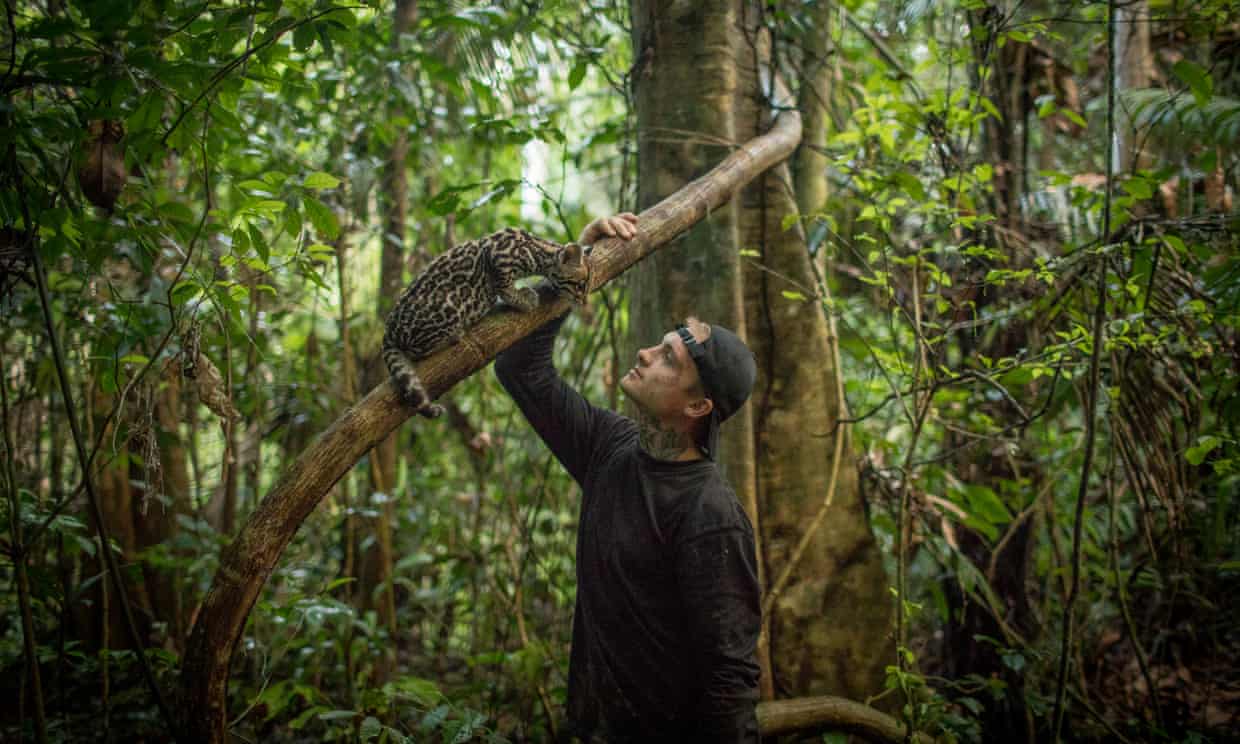
Experience
Experience: I raised an ocelot in the jungle
We would go out for hours at night hunting. I was so proud when he killed his first rodent by himself
by Harry TurnerI joined the army shortly after leaving school. Initially I enjoyed the feeling of brotherhood but, seven months after joining, I was deployed to Afghanistan. In the first week, I saw someone get shot in the head, and held his arm while he died. I was 18 years old. In the six months I was there, I experienced horrific events which led me to question my purpose in life.
I’ve suffered with depression in the past, but when I returned to England, I struggled with PTSD. After being medically discharged, I searched online for ways to help out in the Amazon and came across a volunteer organisation called Fauna Forever, in Peru. I booked a flight with the small payout I’d fought for. I wanted to help animals but, ultimately, I went to Peru with the intention of ending my life.
After a few weeks volunteering, however, I realised that, although I was in a bad place, the jungle was making me happy. I fitted in so much better. I went back and forth between England and Peru over the coming years, but it was on my fourth trip, when I was out in the Amazon for six months, that Keanu came into my life.
I was working at an eco-lodge I’d helped build on a past visit. Some members of the local community had brought a kitten to the lodge. I held him and cried. He was so tiny. His mother had been killed due to logging; he’d been destined for the illegal wildlife trade and hadn’t even opened his eyes yet. I’d previously attempted to rehabilitate another orphaned ocelot in the wild, but Khan was killed by a poacher’s trap when he was 11 months old. This was my second chance. I named him Keanu, after the Matrix films.
Ocelots need a lot of wild space, so we decided to build a platform two hours upriver, deep in the jungle. It was one metre above ground, had a roof and solar panels. Ocelots are nocturnal, so Keanu and I would go out for seven or eight hours a night looking for rodents for him to eat – although we would also catch birds, snakes, lizards, frogs and bats.
A mother ocelot hunts with her offspring, so in the early days I had to help out a lot. I was so proud when, aged five months, he killed his first rodent by himself. That was a big step and it made me feel I was on the right path with him.
I would get time to chill out when Keanu was sleeping. I used solar energy to charge my laptop to watch something, listen to music or cook. I was living both a human and an ocelot life. Every two weeks I’d go by boat to the local community to get supplies for myself: rice, lentils and sometimes a live chicken. I also hunted for birds and went fishing.
The stream near the platform was my lifeline. I didn’t have running water, so I’d collect buckets from the stream for washing myself, my clothes and dishes. If it rained, I’d collect the rainwater to drink, as it was so much fresher.
I was alone a lot, but not always. Some film-makers who were recording my experience in a documentary, Raising Khan, would visit every month. The only thing that scared me in the jungle was my mental health. There were days when I still felt depressed, but I wouldn’t have changed it.
People ask if Keanu ever harmed me. The truth is, yes. Ocelots have sharp claws and teeth, and our skin isn’t as thick as theirs. He would bite, scratch and get defensive over food. I’ve got scars on my arms, legs and face from when the play-fighting became too boisterous.
At first I was very protective of Keanu, but as he got older he would go off and explore, coming back to me as he wanted. He would curl up with me on the forest floor. As time went on, the gap between us grew. By 14 months, he was capable of living by himself, and at that point I had to think about my own physical and mental health. Although the jungle is beautiful, it can wear you down.
I’ve always liked to be alone and have adventures. I don’t feel as if I’ve changed, but I learned a lot. Those two cats taught me more than anyone in my life. The last time I saw Keanu, I gave him some chicken and he went to attack me, to keep me away from his food. That was a good sign.
• As told to Amy Sedghi.
In the UK and Ireland, Samaritans can be contacted on 116 123 or email jo@samaritans.org or jo@samaritans.ie. In the US, the National Suicide Prevention Lifeline is 1-800-273-8255. In Australia, the crisis support service Lifeline is 13 11 14. Other international helplines can be found at befrienders.org.